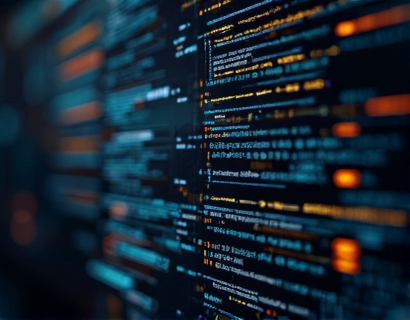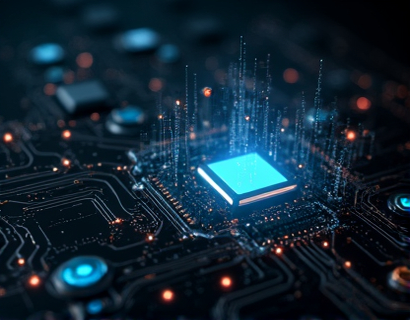AI-Driven Task Management: Simplify Life and Boost Productivity with Intelligent Organizational Tools
In the fast-paced world of today, managing tasks efficiently and maintaining a high level of productivity is more crucial than ever. The integration of Artificial Intelligence (AI) into task management tools has revolutionized the way individuals approach their daily routines and long-term goals. These advanced intelligent tools are designed to simplify task management, enhance focus, and streamline daily activities, offering a transformative approach to personal organization. This article explores the potential of AI-driven task management, providing practical insights and strategies to leverage these technologies for greater efficiency and goal achievement.
AI-driven task management tools are not just about creating to-do lists or setting reminders. They represent a sophisticated layer of intelligence that understands user behavior, predicts tasks, and optimizes workflows. These tools use machine learning algorithms to analyze patterns in user activity, learn from past behaviors, and adapt to individual preferences. By doing so, they provide personalized recommendations and automate repetitive tasks, allowing users to focus on high-value activities that drive meaningful results.
Understanding AI in Task Management
To fully appreciate the benefits of AI-driven task management, it's essential to understand the core technologies involved. At the heart of these tools is natural language processing (NLP), which enables the system to interpret and respond to human language. This capability allows users to interact with the tool using natural commands and queries, making the experience more intuitive and user-friendly.
Another critical component is predictive analytics. By analyzing historical data and current trends, AI can forecast future tasks and deadlines. For instance, if a user regularly schedules weekly team meetings on Tuesdays, the AI can proactively suggest adding these meetings to the calendar well in advance. This foresight not only saves time but also reduces the cognitive load on the user, allowing them to concentrate on more complex tasks.
Enhancing Focus and Reducing Distractions
One of the most significant challenges in maintaining productivity is managing distractions. AI-driven task management tools address this issue by creating focused work environments. These tools can block distracting websites and notifications during designated work periods, ensuring that users remain concentrated on their tasks. Some advanced systems even monitor the user's work patterns and suggest optimal times for deep work, when the mind is most alert and productive.
Moreover, AI can help in prioritizing tasks based on urgency and importance. By analyzing the context and deadlines, the tool can rank tasks and suggest the best sequence for completion. This prioritization helps users avoid the trap of focusing on less critical tasks while important ones slip through the cracks. The result is a more structured approach to task management, leading to higher efficiency and better outcomes.
Streamlining Daily Routines
AI-driven task management tools are not limited to professional settings; they can significantly enhance personal organization as well. For individuals with busy schedules, these tools can integrate various aspects of daily life, from managing household chores to tracking fitness goals. By centralizing all tasks in one platform, users can gain a comprehensive overview of their commitments and allocate time more effectively.
For example, an AI tool can suggest the most efficient order for completing household chores based on factors like time availability and energy levels. It can also remind users of upcoming appointments or events, ensuring that nothing important is overlooked. This level of integration and automation frees up mental space, allowing individuals to enjoy a more balanced and stress-free life.
Personalization and Adaptability
One of the most powerful aspects of AI-driven task management is its ability to personalize the user experience. Each individual has unique preferences, work styles, and goals. AI algorithms can learn from these differences, tailoring the tool's functionality to suit the user's specific needs. Over time, the system becomes more accurate in its predictions and recommendations, further enhancing its effectiveness.
Adaptability is another key feature. As users' priorities and circumstances change, the AI adjusts accordingly. For instance, during a period of intense project work, the tool might suggest reducing social commitments to focus on the task at hand. Conversely, during a break period, it might recommend scheduling leisure activities to recharge. This dynamic approach ensures that the tool remains relevant and useful, no matter the context.
Integration with Other Technologies
The true power of AI-driven task management tools lies in their ability to integrate seamlessly with other technologies and platforms. Many modern tools can connect with calendars, email clients, and project management software, creating a cohesive ecosystem that enhances overall productivity. This integration allows for automatic synchronization of tasks and updates, reducing the need for manual input and minimizing the risk of errors.
For example, an AI task manager can automatically create calendar events based on task deadlines and send reminders to the user's email. It can also pull data from other apps to provide a holistic view of the user's schedule and commitments. This level of interconnectedness ensures that all aspects of a user's life are well-coordinated, leading to a more organized and efficient daily routine.
Building Habits and Achieving Goals
Habit formation and goal achievement are critical components of personal and professional success. AI-driven task management tools can play a significant role in this process by helping users establish and maintain positive habits. Through consistent reminders and progress tracking, these tools encourage users to stick to their routines and work towards their objectives.
Goal setting is another area where AI excels. Users can define long-term goals, and the AI will break them down into actionable steps with realistic deadlines. The tool can then monitor progress, provide feedback, and adjust the plan as needed. This structured approach not only makes goals more attainable but also boosts motivation by providing a clear path to success.
Overcoming Common Challenges
While AI-driven task management tools offer numerous benefits, they are not without challenges. One common issue is the initial learning curve associated with adopting new technology. However, most modern tools are designed with user-friendly interfaces and comprehensive onboarding processes to minimize this barrier.
Another challenge is data privacy and security. Since these tools often handle sensitive information, it's crucial to choose platforms that prioritize user data protection. Reputable tools will have robust security measures in place, including encryption and compliance with data protection regulations.
Case Studies and Real-World Applications
To better understand the impact of AI-driven task management, let's look at some real-world applications. In the corporate world, teams use these tools to streamline project management, ensuring that all tasks are assigned, tracked, and completed on time. For instance, a marketing team can use an AI tool to manage campaign timelines, content creation, and distribution, all while receiving real-time updates and alerts.
On an individual level, students can leverage AI task managers to organize assignments, study schedules, and exam preparations. The tool can remind them of upcoming deadlines, suggest optimal study times based on their performance patterns, and even provide resources for better understanding of complex subjects. This level of support can significantly reduce stress and improve academic performance.
Future Trends in AI Task Management
The field of AI-driven task management is rapidly evolving, with several exciting trends on the horizon. One such trend is the integration of augmented reality (AR) and virtual reality (VR) to create immersive task management experiences. Imagine being able to visualize your task list in a 3D space, interact with virtual reminders, and receive guided instructions for complex tasks.
Another trend is the increased use of emotional intelligence in AI systems. By understanding the user's emotional state, these tools can offer more empathetic support and tailored recommendations. For example, if the AI detects that a user is stressed, it might suggest a break or a relaxation exercise to help manage stress levels.
Conclusion
AI-driven task management tools represent a significant leap forward in personal organization and productivity. By leveraging advanced technologies like NLP, predictive analytics, and machine learning, these tools offer personalized, adaptive, and integrated solutions that simplify daily routines and boost efficiency. Whether you're a busy professional, a student, or an individual looking to improve your personal life, AI-driven task management can provide the support and structure needed to achieve your goals.
As the technology continues to evolve, the potential for even more innovative applications is vast. Embracing these tools not only enhances individual productivity but also contributes to a more organized and fulfilling life. By integrating AI into task management, we can unlock new levels of efficiency, creativity, and success.











































